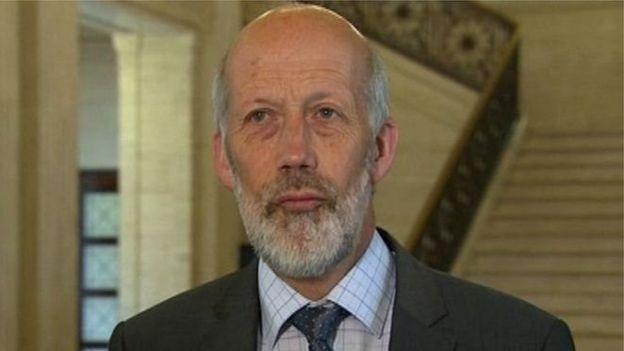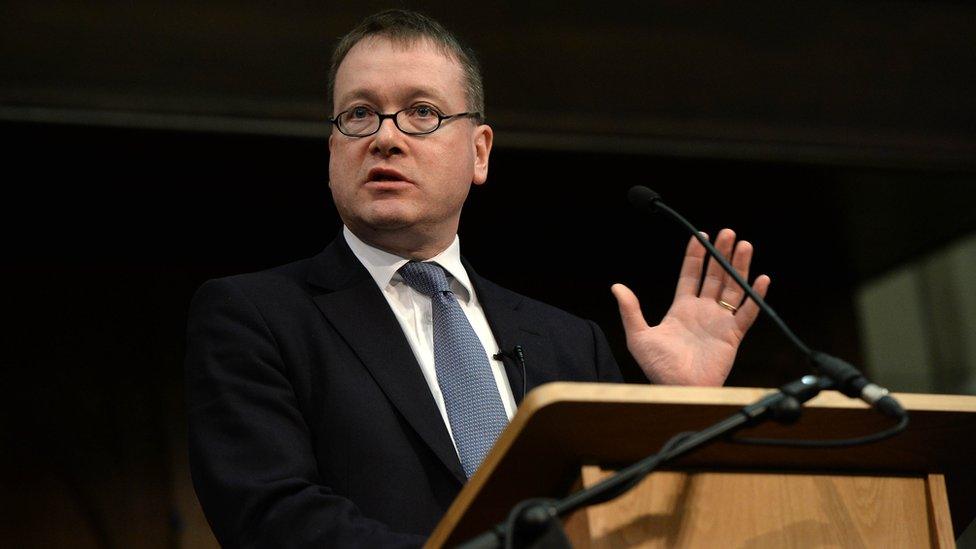Abortion: NI justice minister to appeal High Court ruling
- Published

The justice minister says he is lodging an appeal to a High Court ruling that abortion law in Northern Ireland is "incompatible" with human rights law
Stormont's justice minister is lodging an appeal to a High Court ruling that abortion law in Northern Ireland is "incompatible" with human rights law.
David Ford said he was concerned that a lack of "legal certainty" could lead inadvertently to abortion on demand.
In December, a judge ruled the law does not comply with the European Convention on Human Rights in cases of fatal foetal abnormality or sexual crime.
The case was brought by the Northern Ireland Human Rights Commission.
'Incremental widening'
The current legislation differs from the rest of the UK as the 1967 Abortion Act was never extended to Northern Ireland.
Currently, a termination is only permitted in Northern Ireland if a woman's life is at risk or if there is a risk of permanent and serious damage to her mental or physical health.
The commission took legal action against Mr Ford's Department of Justice as part of its campaign for a change in the law.

David Ford says he is concerned that a lack of what he calls "legal certainty" in the judgement
Mr Ford will now challenge part of December's ruling at the High Court in Belfast, where the judge talked about the balance to be struck between the Article 8 rights of a pregnant woman and the Article 2 rights of a foetus.
The minister said this could lead to an "incremental widening of abortion law", even further than the 1967 Abortion Act allows in the rest of the UK.
Speaking on BBC's Good Morning Ulster programme, he said: "The real danger is that the way the judgement read human rights law, specifically the article A right to a private life of the woman, against what was said to be no article 2 rights for a foetus."
Mr Ford said this potentially goes "beyond the 1967 act as it applies in the rest of the United Kingdom".
He added that "the way in which the decision was expressed" suggested that "all rights to determine lay with the woman, up to the point of viability for the foetus".
Mr Ford explained that this is not the case elsewhere in the United Kingdom, adding: "I believe that is not what people in Northern Ireland would wish to see.
Pointing the finger at the executive for the lack of legislation on abortion, Mr Ford said: "Ultimately the executive should be approving a paper from the Department of Justice and the assembly should be legislating to ensure that women carrying a foetus with a fatal abnormality are able to access an abortion."
He said his expectation is that his appeal will be heard before the summer, but added that there was "nothing within the court process which would stop the executive and the assembly moving forward with legislation" before then.
Sexual crimes
The minister is also appealing the judge's ruling on sexual crimes, again on the grounds of clarity.
He said it is very difficult to define when sexual crimes have been committed - particularly in a court of law - before a pregnancy has reached full term.
"The reality is that my department consulted over a year ago on the issue of both fatal foetal abnormality and sexual crime," he said.
"In that consultation, it was not possible to see an easy way through as to how you would determine if a sexual crime had happened."
On Monday, Northern Ireland Attorney General John Larkin also lodged an appeal to the judgement.
- Published16 December 2015

- Published16 December 2015

- Published25 January 2016
